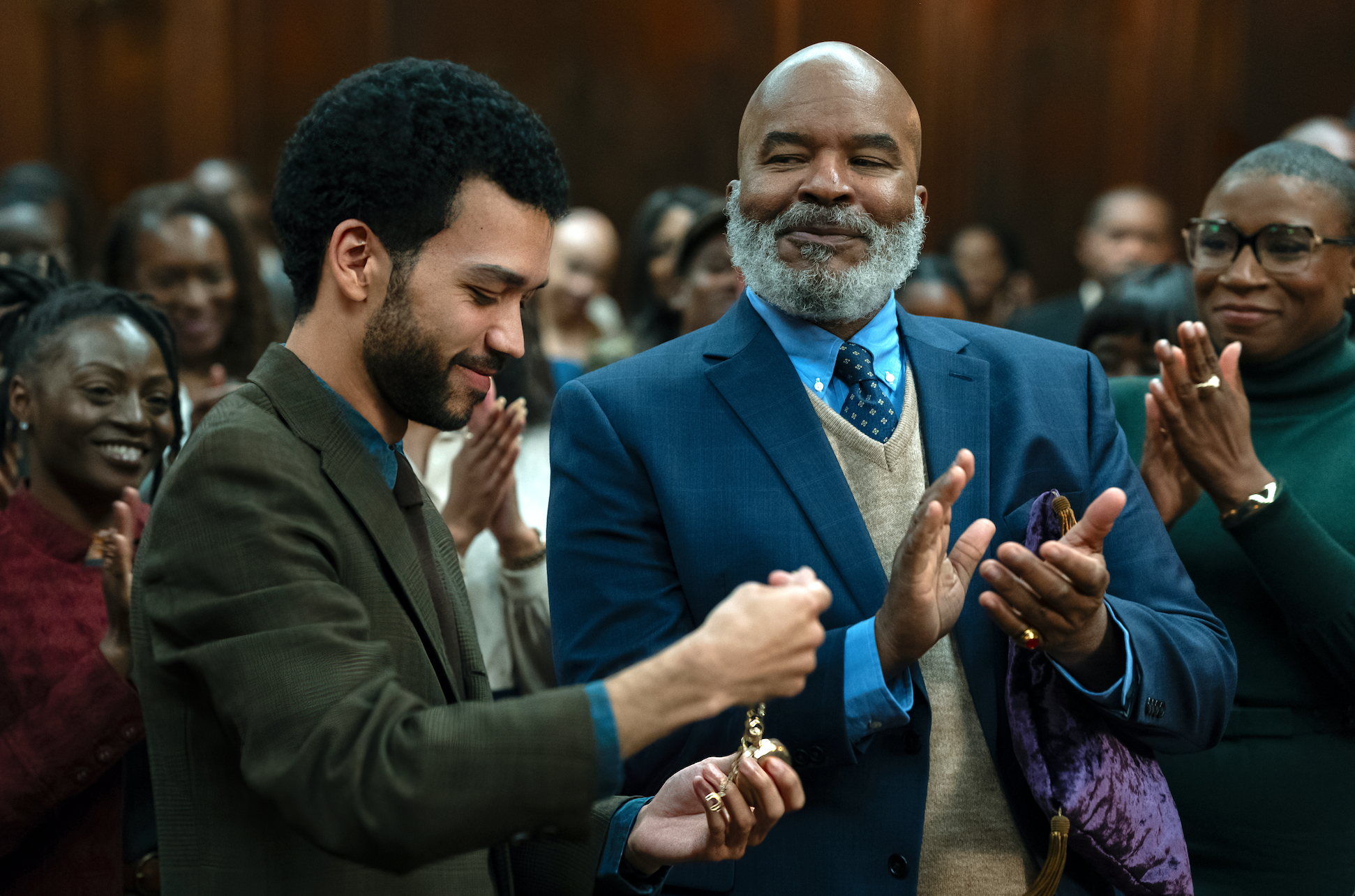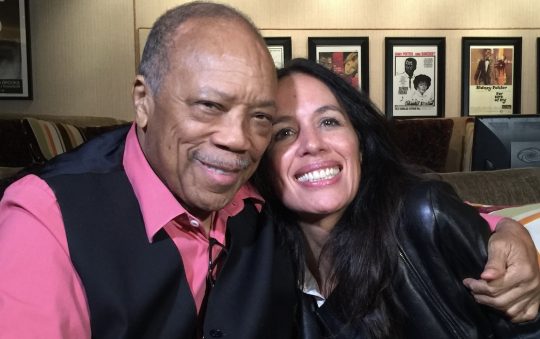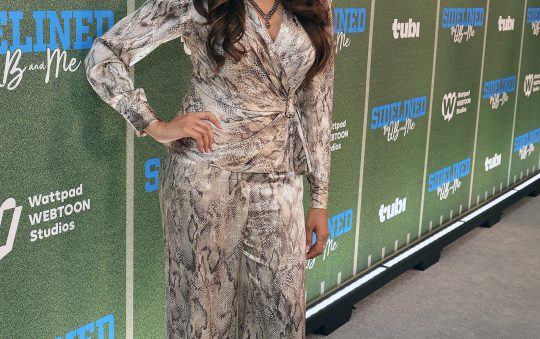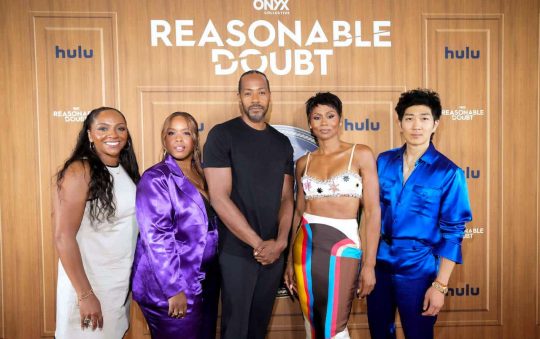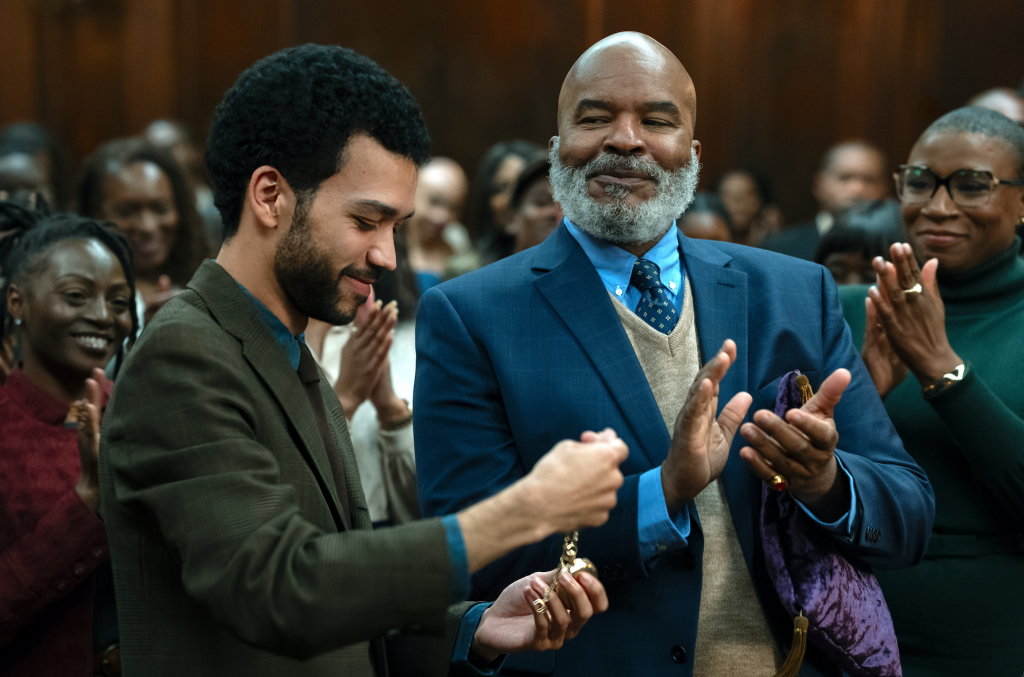
“The American Society of Magical Negroes” is a satirical comedy inspired by the cinematic “magical negro” trope in which Black characters only exist to help a white protagonist accomplish their goals. While the term was popularized by director Spike Lee during a lecture series in 2001, the trope has existed since the dawn of cinema.
Historically, the “magical negro” character is in a subservient role such as a maid, janitor, prisoner, an assistant. Even seemingly esteemed roles like a coach or mentor may be a “magical negro” when they possess immense wisdom and a magical prowess yet lacks any character development or purpose outside of being of service to their white counterparts.
The film’s writer, director, and producer Kobi Libii addresses this trope head-on through the main character Aren (actor Justice Smith) a biracial yarn sculptor who’s unable to advocate for himself in white spaces. When Aren finds himself in a precarious situation, Roger (actor David Alan Grier) suddenly appears and uses a submissive charisma to quell the situation.
Roger then whisks Aren away to a secret realm where the latest class of “magical negroes” are learning societal protocol and receiving their assignments. Aisha Hinds plays Gabbard the head instructor, and Nicole Byers plays Dede the authoritative grand priestess of the society. Members are tasked with managing white fragility by ensuring white people are content with their lives which in turn will help keep Black people safe.
Related Stories
BHERC Youth Diversity Film Festival Set for March 23
Multitalented Teen Che Tafari is Making His Paramount+ Debut
Aren soon receives an assignment that requires him to assimilate into a tech company with the task of helping his coworker Jason (actor Drew Tarver) be recognized for his contributions to the company. Aren soon learns that his assignment also includes being the matchmaker for Jason and his crush Lizzie (An-Li Bogan).
This conflict of interest, coupled with Jason’s microaggressions comes to a boiling point when Aren realizes that he’s being used as a token to help the company’s CEO Mick (Rupert Friend) rebrand after a race-related scandal. The result is a climactic and revelatory moment for all.
The Sentinel spoke with Libii, Smith, Grier, and Byers about their personal connection to the messages in the film as well as audiences’ reactions thus far.
When asked if there’s a particular call to action or take away from the film, Libii shared, “[I hope] Black audiences feel more empowered, bigger, bolder and able to take up more space after seeing the journey of a Black man who learned to speak up for himself to a greater extent.
“As for white audiences, one of the hopes is some empathy and the capacity to listen to us and our stories. That’s the call to action, be comfortable listening instead of being the center of attention for a change,” added Libii.
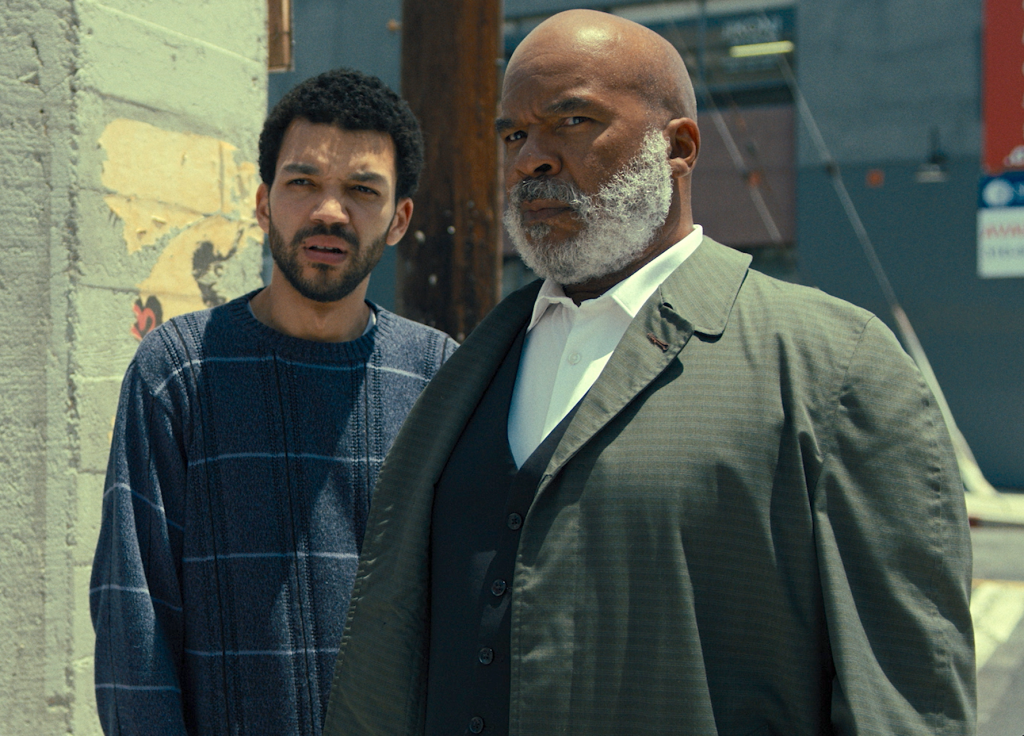
In watching the film, there may be an assumption that navigating predominately white spaces would be easier for biracial people. The Sentinel asked Smith and Libii if they believed their Caucasian mothers adequately prepared them for the adversaries that they would face in the world.
“Having a parent who doesn’t fundamentally understand the way that her son is going to be treated by the world is isolating and it puts a lot of the responsibility on the child to navigate those spaces,” Smith candidly shared.
“I had to go on a self-discovery journey and do a lot of the self-empowerment work by myself. And I think this film highlights that dynamic of growing up in a half-white household.”
Libii added, “There’s a tremendous amount of privilege that I have moving through the world because of the way that I look. That said, part of the message of the film is about the false promise of assimilation. Even though Justice and I have this incredible privilege because of our skin color and because of the white advocates in our lives, we’re still treated as Black in America. Is it a different experience than some of our darker skin peers? Absolutely. We understand and acknowledge that.”
Libii went on to say, “In terms of criticizing that false promise, it’s really important to see that even people who are as light as Justice, and myself, and even people as accommodating as the Aren character in the film, even they are not invited into the full privileges of whiteness, and that helps clarify that, we’re never really going to be let in, it doesn’t matter how nice we are. So let’s let that false talking point fall away.”
In the patriarchal role of Roger, David Alan Grier’s presence grounds the film with the historical context of the magical negro trope. With a resume that spans four decades, The Sentinel asked the Tony Award-winning actor if there was anything new that he gleaned from his experience working on the film.
Grier revealed, “What was new to me is a lot of white people’s reactions to this film. Meaning they were absolutely ignorant about the whole existence of the magical Negro character while it’s common knowledge to us,” he said.
“I just spoke to a guy who said he felt ashamed that he was unaware of all of these roles that Hollywood kept giving us and kept repackaging [such as] ‘Driving Miss Daisy’ and ‘The Green Mile.’ I actually found that surprising because I just thought, you knew, it’s not a secret.”
We asked Grier to expound upon this. If white moviegoers weren’t familiar with the magical negro trope, then what do they consider these supporting Black characters to be? Grier said, “They never questioned where does this Black character come from? Who is their love interest? Do they have a house? Do they have a family? Do they have a life? No, they’re just in the corner going, ‘If I were you, I’d go out the other door.’”
He continued, “The happy servant, the oblivious day worker doesn’t have any wants, desires, or anything, but that’s not true and I thought we all knew that.”
In response to Grier, Byer profoundly added, “I think that’s really interesting the way some people have left the film saying, ‘I didn’t even know’ [the magical negro trope existed]. And it’s like, ‘Yeah because you’re typically centered’. When you’re the standard, how do you understand when something deviates from the standard? If you’re watching a movie and you see yourself represented, if you don’t have a lot of black people in your life, then you’re like, ‘Well this is normal,’” said Byers.
When the film’s trailer hit the internet, Black Twitter was set ablaze when people realized that the “magical” aspect wasn’t like the wizardry in “Harry Potter,” but instead a reference to the racial trope.
Libii reacts to the social media controversy, “I have a bone to pick with how Hollywood has represented us. So, I understand that reaction. And part of what I think we’re hoping for is that the same people who were challenged by the trailer and have a point of view about it will see the whole film which, I believe is a more nuanced conversation about these issues.”
Echoing similar sentiments, Byers hopes that prospective filmgoers will put their assumptions aside and support the film.
“Yes, it’s a controversial title but go see it and see if it lines up with your expectations, because at the heart of the film is a unique take on a romcom wrapped up in a really fun, brilliant premise,” he said.
Focus Features presents “The American Society of Magical Negros” in theatres on March 15th.



